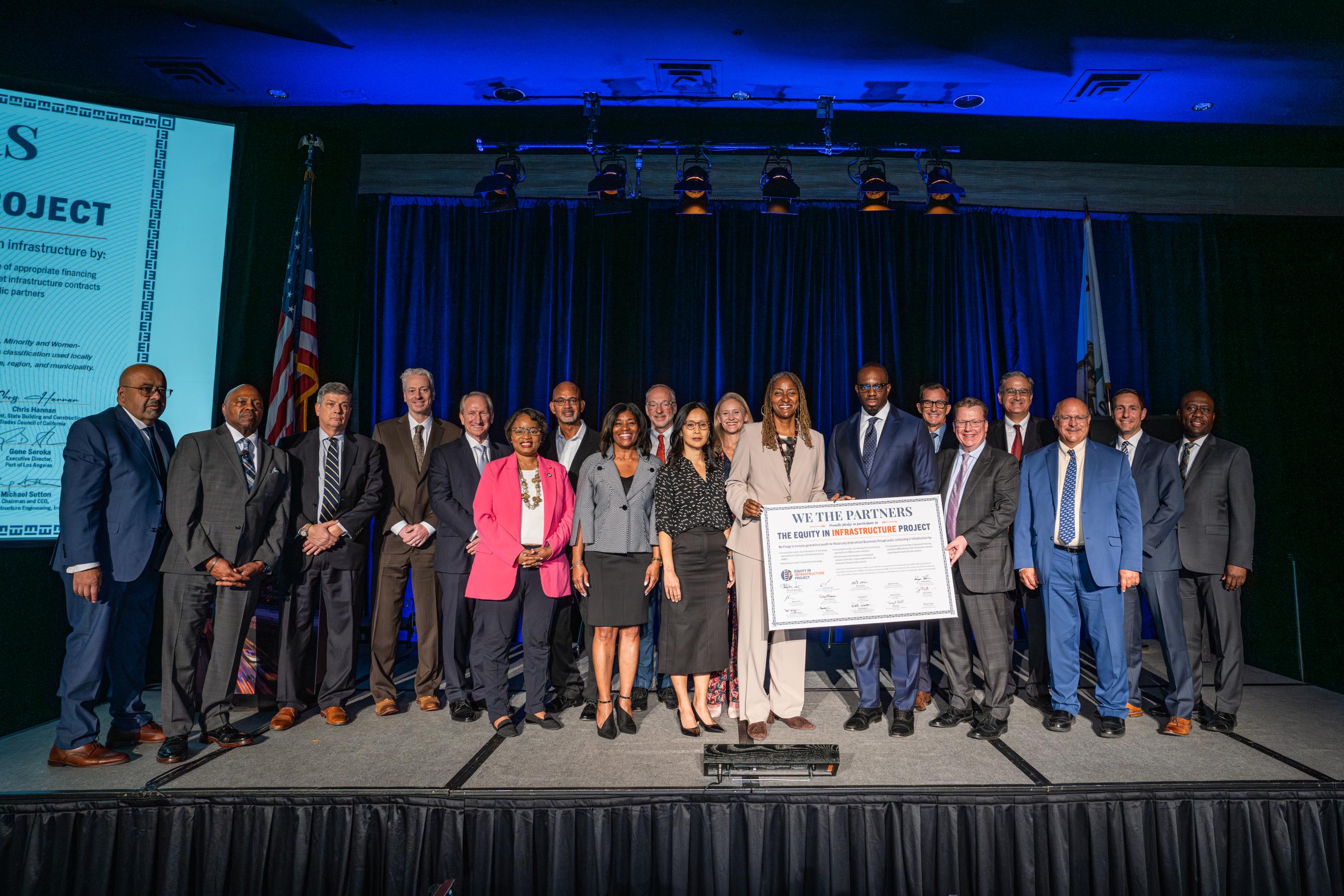California agencies with tens of billions of dollars of construction in the works joined more than 40 other groups around the country on Nov. 20 in a movement to drive contracting opportunities for historically underutilized businesses, known as HUBs.
Fourteen public and private-sector infrastructure executives signed the Equity in Infrastructure Project Pledge at the Los Angeles Infrastructure Forum, produced by ENR in partnership with Infrastructure LA, a coalition of local agencies collaborating to seek funding and create resilient, equitable infrastructure for Los Angeles residents.
“Opportunities breed success,” said Toks Omishakin, California Secretary of Transportation, describing the importance of the move. It signifies a change from “symbolic efforts around equity to systemic work," he explained, from changing the name of a school, for example, to increasing the number, size and proportion of contracting opportunities going to HUBs as prime contractors.
Omishakin, who was one of six state DOT secretaries who signed the pledge last year, sees it as a concrete commitment that “takes intention and brings together agencies, companies and NGOs who can learn from one another” and take action. “Our work has become that much more complicated in the wake of new lawsuits and Supreme Court decisions,” he added, referring to the recent U.S. Supreme Court decision against affirmative action and a federal lawsuit filed against the federal disadvantaged business enterprise (DBE) program.
More Equitable Contracting Processes
Los Angeles County Supervisor Holly Mitchell added her commitment to delivering infrastructure projects “with an equity lens not only in what we deliver, but also in how we deliver it.”
Mitchell personally signed the pledge, promising that the county will create “more equitable contracting processes to allow communities to access public infrastructure dollars and to build wealth for those that have been systematically excluded—intentionally excluded.”
In the nation’s largest county with more than 10 million people, Mitchell directed county agencies to sign the pledge and implement it in their plans to spend $6 billion a year on new infrastructure in the run up to the 2028 Olympics.
Mitchell also announced at the forum that Los Angeles County will triple the number of “small and certified small businesses in the region with an emphasis on small minority businesses.” Its Department of Economic Opportunity will launch an outreach campaign to make small firms aware of the opportunities with “a $2-million revolving loan fund to support startup costs as small businesses obtain county contracts.” She also pledged a network of small business advocates in country departments, empowered to advance inclusive procurement practices.
“We are committed to ensure that our small and minority firms have the technical assistance they need to access these career-changing government contracts,” Mitchell said.
Agency signatories were Stephanie Wiggins, CEO, LA Metro; Martin Adams, general manager, Los Angeles Dept. of Water and Power; Gene Seroka, general manager, Port of Los Angeles; Beatrice Hsu, interim CEO, Los Angeles World Airports; Mark Pestrella, director, LA County Public Works; Robert Ferrante, general manager, L.A. County Sanitation Districts; Selwyn Hollins, director, L.A. County Internal Services Dept.; and Kelly LoBianco, director, L.A. County Dept. of Economic Opportunity.
Signatories included four construction industry firm leaders: Matt Crane, executive vice president and regional chief executive, AECOM; Dolla Dawson, COO of business operations, Milhouse Engineering & Construction; Terry Ruhl, board chair and CEO, H.W. Lochner; and Michael Sutton, chairman and CEO, Infrastructure Engineering Inc.
Chris Hannan, president, State Building and Construction Trades Council of California, also signed the pledge, representing 157 affiliated state construction locals from 14 different crafts, 22 local building trades councils and about 125 joint apprenticeship training committees—involving almost 500,000 members.
A Nationwide Effort
After the LA Infrastructure Forum ceremony, the Equity in Infrastructure Project Pledge has 56 signatories, including leaders of transit authorities, airports, ports, water districts, engineering and construction firms in 17 states, the District of Columbia and Puerto Rico. The White House has directly called on Bipartisan Infrastructure Law grantees to sign the pledge, EIP reports.
The EIP was founded by Phillip A. Washington, EIP co-chair and CEO of Denver International Airport (DIA), along with co-chair John Porcari, former deputy secretary of transportation under President Obama. Both worked on the Biden-Harris Policy Committee and helped draft the executive order around equity that President Biden signed on his first day in office in 2021.
“We began to think about how to operationalize that executive order,” Washington said at the forum, and came up the idea of the pledge—initially signed by five agency leaders from DIA, the Chicago Transit Authority, the Southeast Pennsylvania Transportation Authority, the Metropolitan Water District of Southern California and the Port of Long Beach.
Giving specific examples, Washington talked about putting language in procurement documents at DIA to encourage minority firms to be awarded prime contracts and to encourage joint ventures with small, minority and women-owned business. Terri Mestas, chief development officer for Los Angeles World Airports, also described removing barriers such as insurance requirements that are unnecessary until a firm gets the work and boiling down the agency’s 2,000-page design and construction guideline to 200 pages.
“This is the biggest amount of money that we’ve seen for infrastructure in our lifetimes,” Washington pointed out, “and the administration has made equity a guiding post. We have to be bold in leading these massive projects—we cannot be afraid to do the things we have to do!”
